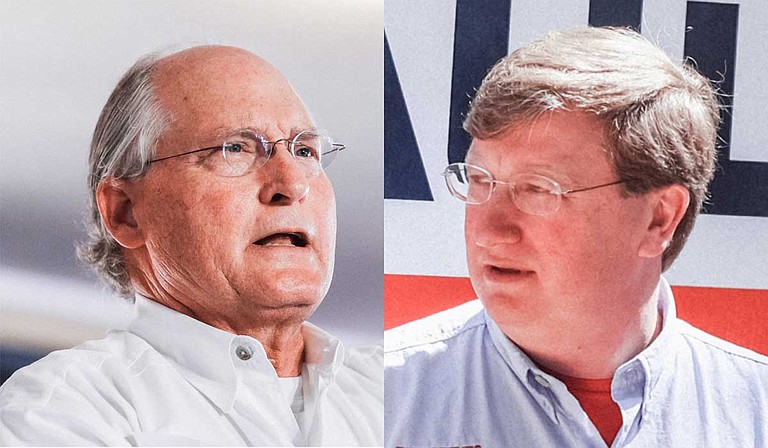A mailer from Tate Reeves' (right) campaign made several misleading claims about Republican runoff opponent Bill Waller's (left) Medicaid expansion plan. Photo by Ashton Pittman
Thursday, August 15, 2019
Mississippi Lt. Gov. Tate Reeves' campaign sent a mailer to Mississippi voters this week with the word "OBAMACARE" emblazoned across it that includes false information about the health-care plan that his opponent in the Republican runoff for governor, former Mississippi Supreme Court Chief Justice Bill Waller Jr., is proposing.
Waller's plan, which he calls "Medicaid reform," would accept more than $1 billion in yearly federal funding to expand the state's Medicaid program, which would bring affordable health-care options to about 300,000 Mississippians and could keep dozens of financially imperiled rural hospitals afloat.
The plan is essentially Medicaid expansion, a key component of former President Barack Obama's signature law, the Affordable Care Act. But Waller's proposal includes more conservative provisions similar to those that Republican U.S. Vice President Mike Pence enacted when he expanded Medicaid in Indiana while governor.
The Reeves mailer makes several claims that the Jackson Free Press verified are false.
False Claims on Costs, Impact in Louisiana
For one, Reeves' mailer claims Waller's plan would "cost state taxpayers over $200 million per year." The plan that Waller supports, which the Mississippi Hospital Association introduced in May, would not rely on state tax funds.
The federal government has already agreed to pay 90% of the cost of Medicaid expansion, which would leave the state to pay around $159,000 per year by 2025 under a straightforward expansion, the Mississippi Institutions of Higher Learning estimated four years ago. That study also estimated that expansion would create 9,000 new jobs in the state, adding an extra $96 million to coffers each year by 2025.
Vying for Mississippi Governor: The Issues Post-GOP Debate and Beyond
Find out where top candidates in the race for governor stand on issues like Medicaid expansion, private school vouchers, teacher pay, mental health, abortion rights, and more.
Under Waller's plan, though, Mississippi taxpayers would pay none of the remaining 10%. Instead, recipients of expanded Medicaid would pay limited fees, including a $20 monthly premium and $100 for nonemergency ER visits, while hospitals would cover the remaining costs.
Reeves' mailers also claims Waller's plan would "drive up the cost of private health insurance" and "cause thousands to lose their current insurance." It points to Louisiana, which expanded Medicaid in 2016, as having experienced these pitfalls.
In fact, data from the U.S. Census Bureau show that Louisiana's uninsured rate dropped after it expanded, falling from 10.3% to 8.4% between 2016 and 2017, with 471,115 people gaining coverage. Over that same period, the uninsured rate in neighboring nonexpansion states increased, rising from 11.8% to 12% in Mississippi; from 16.6% to 17.3% in Texas; and from 9.1% to 9.4% in Alabama.
What Mississippi Voters Want from Candidates, Media
Ashton Pittman talks to Mississippi voters about the solutions they want to hear about over just the usual horserace of campaigns. #MSCitizensAgenda
Last year, the Louisiana Department of Health partnered with Louisiana State University to study the impact of Medicaid expansion on its economy. The 2018 study found that the expansion helped create about 19,200 jobs throughout the state, and about $3.5 billion to the state's economy.
The expansion also helped the state save $317 million last year, because expansion gave Louisiana access to lower federal financing rates for the traditional Medicaid care it already provided.
'It is 100% False'
Since Mississippi leaders, including Gov. Phil Bryant and Reeves, declined to expand Medicaid, five rural hospitals in the state have shut their doors. The 2015 IHL study warned that "without the Medicaid expansion, hospitals (would) be faced with the need to find new sources of funds ... in order to cover the cost of providing uncompensated care to the uninsured." Rural hospitals have cited the cost of providing emergency treatment to uninsured people who cannot pay as a factor in closures.
No rural Louisiana hospital has closed since that state expanded Medicaid, though. Across the country, 106 rural hospitals have closed, and 72% were in states that declined to expand Medicaid.
"Some say we are doing fine. The fact is, we have 31 rural hospitals on the verge of closing," Waller told a crowd at the Neshoba County Fair on Aug. 1. "This is where we are. This is the decision point."
Let's Talk Jackson Politics Podcast
Issues-focused election podcasts with Hinds County, legislative and statewide candidates focusing on substance over partisan horse-race politics.
The Jackson Free Press called Waller's campaign on Wednesday evening for comment, but a spokesperson said they would need to look at the mailer before responding.
This morning, Waller Communications Director Jared Solomon sent the Jackson Free Press a one-sentence statement about the mailers.
"This negative, attack mailer is the definition of politics as usual because it is 100% blatantly false—not just some of the points, but literally every reference to Waller's positions are false," the statement reads.
GOP Runoffs on Aug. 27
Reeves and Waller go head-to-head in a Republican party runoff on Aug. 27—the first time that has happened in a GOP primary for governor since 1991. In 2011, then-Lt. Gov. Phil Bryant won the Republican nomination for governor outright with 59% of the vote.
The Aug. 27 primary runoffs are open to any registered voter. However, if you voted in one party's primary in the Aug. 6 election, you cannot switch parties and vote in the other runoff.
"If you voted in the Republican primary, you cannot vote in the Democratic (runoff) primary in three weeks and vice versa," Hinds County Republican Party Chairman Pete Perry told the Jackson Free Press on Aug. 7. "If you did not vote, you can vote in whatever primary."
After voters decide, the GOP nominee will face Attorney General Jim Hood on Nov. 5.
Current Mississippi Treasurer Lynn Fitch and Madison attorney Andy Taggart also go head-to-head in a runoff in the GOP race for attorney general on Aug 7, as well as runoffs in a number of Jackson-area legislative and Hinds County races.
Because Foster ran in the Republican primary for governor, he could not run for re-election to his House seat, which he first won in 2015. A new representative will replace him in the House in January 2020.
Mississippians must register at least 30 days before an election in order to be eligible to vote and must show an accepted form of photo ID at the voting booth, a list of which is available on the secretary of state's website. County circuit clerks across the state offer all residents free photo IDs that they can use to vote.
Follow state reporter Ashton Pittman on Twitter @ashtonpittman. Send story tips to [email protected]. Follow statewide election coverage at jacksonfreepress.com/2019elections.





Comments
Use the comment form below to begin a discussion about this content.
Sign in to comment
Or login with:
OpenID